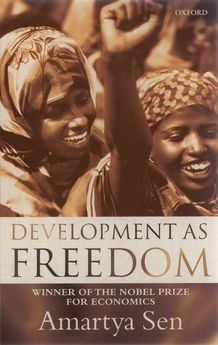In Development as Freedom Amartya Sen explains how in a world of unprecedented increase in overall opulence millions of people living in the Third World are still unfree. Even if they are not technically slaves, they are denied elementary freedoms and remain imprisoned in one way or another by economic poverty, social deprivation, political tyranny or cultural authoritarianism. The main purpose of development is to spread freedom and its 'thousand charms' to the unfree citizens.
Freedom, Sen persuasively argues, is at once the ultimate goal of social and economic arrangements and the most efficient means of realizing general welfare. Social institutions like markets, political parties, legislatures, the judiciary, and the media contribute to development by enhancing individual freedom and are in turn sustained by social values. Values, institutions, development, and freedom are all closely interrelated, and Sen links them together in an elegant analytical framework. By asking 'What is the relation between our collective economic wealth and our individual ability to live as we would like?' and by incorporating individual freedom as a social commitment
into his analysis Sen allows economics once again, as it did in the time of Adam Smith, to address the social basis of individual well-being and freedom.
Features
- Written by one of the leading development economists in the world, winner of the Nobel Prize for Economic Science
- Hardback has been brilliantly received and reviewed — including acclaim from the Secretary General of the United Nations
- This is a key book for all those with an interest in international development and world economics
Introduction: Development as Freedom
1The Perspective of Freedom
2The Ends and the Means of Development
3Freedom and the Foundations of Justice
4Poverty as Capability Deprivation
5Markets, States, and Social Opportunity
6The Importance of Democracy
7Famines and Other Crises
8Women's Agency and Social Change
9Population, Food and Freedom
10Culture and Human Rights
11Social Choice and Individual Behaviour
12Individual Freedom as a Social Commitment
Anyone with a general interest in economics and the developing world; students of economics, development studies, politics etc.
